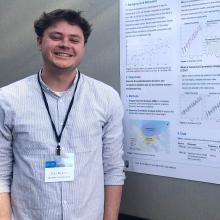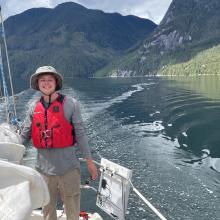Tyler De Jong
Why did you decide to pursue a graduate degree?
After earning my undergraduate degree in environmental engineering, I spent several years working in the field of coastal and river engineering. I really enjoyed the work and wanted to build a stronger theoretical foundation, expand my technical skills and take on more complex projects. A graduate degree was a great next step.
Why did you decide to study at UBC?
I chose to return to UBC because of the great experience I had during my undergraduate studies. It has a strong academic and research environment, awesome student community and being just a 15-minute walk from the library to the beach couldn't be more ideal for a coastal engineer.
What is it specifically, that your program offers, that attracted you?
UBC's hydrotechnical engineering program stood out for its wide range of research opportunities and hands-on projects that aligned with my interests. I was keen to get involved in flood modelling, and after speaking with professors from universities across the country, this program at UBC was the best fit. It's stipend and teaching assistant opportunities also made it possible for me to focus fully on my studies.
What was the best surprise about UBC or life in Vancouver?
What surprised me most about UBC was how much there is to do: student clubs, volunteering, sports and events. There's always something happening.
What aspects of your life or career before now have best prepared you for your UBC graduate program?
Spending a few years in industry before grad school helped me discover what I find most interesting and meaningful. It gave me practical skills and a grounded perspective that I now bring to my research. I couldn't be more excited to continue learning, grow my expertise and tackle challenges in coastal and river engineering.
What do you like to do for fun or relaxation?
I spend as much time on and in the water as possible: sailing, swimming and freediving.
What advice do you have for new graduate students?
As cheesy as it sounds, put yourself out there and try new things. Join a student club for that hobby you enjoy, sign up for Day of the Longboat and volunteer to help with other projects in your lab. Get involved. It can be tough to make time for things outside of research, but it's well worth it in the end. You get out of it as much as you put into it.
Learn more about Tyler's research
My research focuses on forecasting compound flood hazards in the Fraser River Estuary, where river flows, storm surges, astronomical tides and regional sea-level anomalies can combine to cause extreme flooding. Sea level rise driven by climate change intensifies these risks. Despite events like the November 2021 atmospheric river, few studies have explored how these flood drivers interact in this region. To address this gap, I use a new, highly efficient modeling tool called SFINCS to simulate compound flooding events and apply probabilistic methods to assess their likelihood and risks. This work is part of the Open-Source Flood Risk Analysis Network for Canada (Open-FRANC), a nation-wide initiative focused on open-source flood hazard and risk analysis. Together, this research supports integrated coastal zone management and helps protect vulnerable communities and ecosystems in the Fraser River Estuary.


